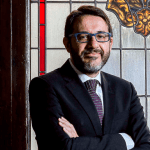ÁMBITO EUROPEO
Helena Dalli,
comisaria europea de Igualdad
«El racismo está vivo en Europa»
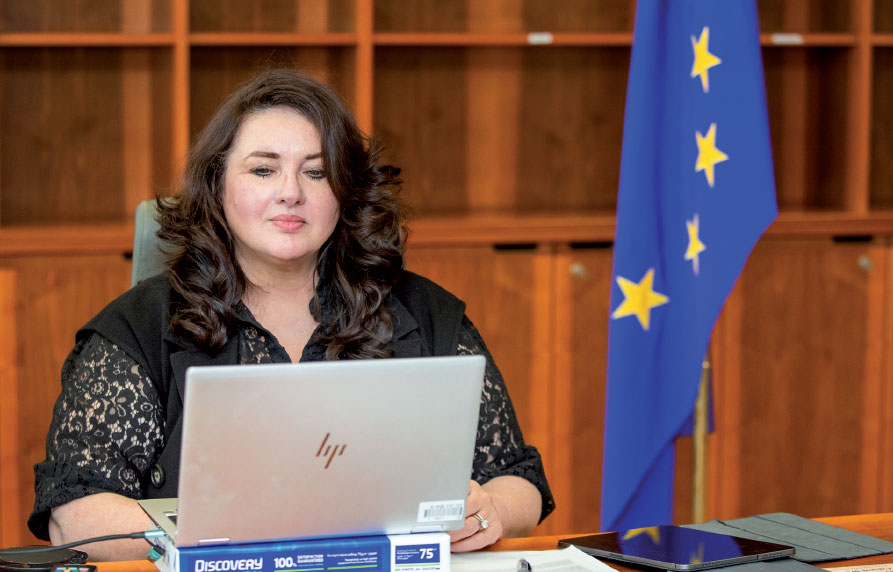
Helena Dalli se convirtió el pasado diciembre en la primera comisaria de la UE para la Igualdad, un tema al que esta maltesa ha dedicado su vida y su carrera política. Está inmersa en varias estrategias para luchar por la igualdad de género y apoyar a las minorías y los grupos vulnerables en Europa, incluido el colectivo gitano y LGTBI, especialmente después del impacto del Covid-19.
JORGE VALERO
TRAS EL ESTALLIDO de las protestas contra el racismo en todo el mundo, Dalli también se encargará del nuevo plan de acción de la Comisión Europea para abordar el racismo estructural existente en todos los ámbitos de nuestra Unión. Porque, como señala en esta entrevista con ESCRITURA PÚBLICA, “el racismo está vivo en Europa”.
–La Comisión presentará un plan de acción contra el racismo a finales de este año. ¿Qué iniciativas está considerando?
–Antes de que estallaran las protestas recientes ya estábamos discutiendo sobre este tema, porque el racismo está vivo en Europa, no solo en los Estados Unidos. Es irónico que celebremos los 20 años de la Directiva sobre igualdad racial, y todavía tengamos problemas estructurales. El racismo no ha sido erradicado. Existe una gran brecha entre la legislación y la eficacia de esa legislación en la vida de las personas. Nos centraremos en lo que está debajo de la punta del iceberg, el racismo estructural, que es más difícil de abordar.
–¿Qué quiere decir?
–Existe un problema cuando observamos el desempleo, por ejemplo, discriminaciones en las contrataciones, también con la vivienda o en materia de salud. A veces existen sesgos inconscientes. Sin saberlo, las personas pueden ser racistas, especialmente las personas blancas en el sentido de que nos identificamos con personas que son “como nosotros”, por lo que podríamos estar discriminando sin saberlo.
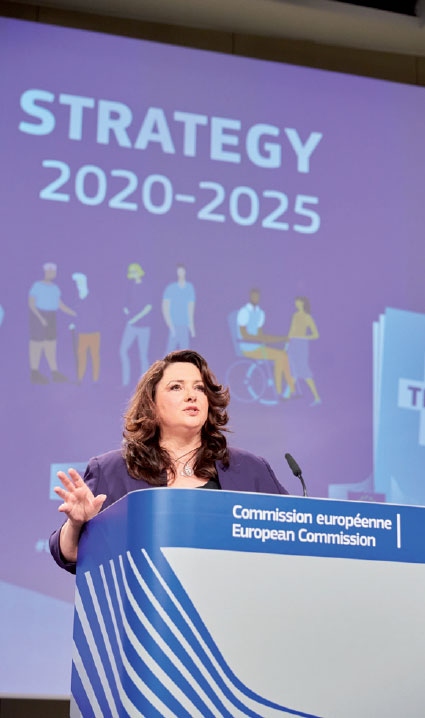
–¿Es el caso también dentro de la Comisión?
–Estamos mirando lo que sucede también internamente. Hemos estado trabajando con el comisario de Recursos Humanos, Johannes Hahn, para ver cómo podemos abordar esta realidad. No se cambiará de la noche a la mañana. Pero tampoco es suficiente con decir que las personas de color no se postulan. Tenemos que ver qué
tipo de educación, de prácticas están recibiendo para poder obtener buenas calificaciones para competir. Nuestra intención es no dejar piedra sin remover. El hecho de que, por primera vez, la UE tenga una cartera dedicada por completo a la Igualdad es un mensaje de que Europa necesita abordar estas realidades de manera sólida. Tenemos mucho por hacer.
–¿Cree tal vez que hubo algún tipo de racismo estructural también dentro de la Comisión Europea dada la falta de diversidad en el personal?
–Existe un sesgo de que a veces ni siquiera somos conscientes. Y sí, racismo estructural. Pero creo que está en todas partes. Por eso debemos abordar las raíces del problema, no solo los síntomas, no solo los resultados. Tenemos que salirnos del guion y encontrar maneras de ver cómo podemos aportar más diversidad en todo el proceso. Por ejemplo, con las universidades, y podemos ofrecer prácticas y aseguramos de que nuestros procesos de selección son más diversos.
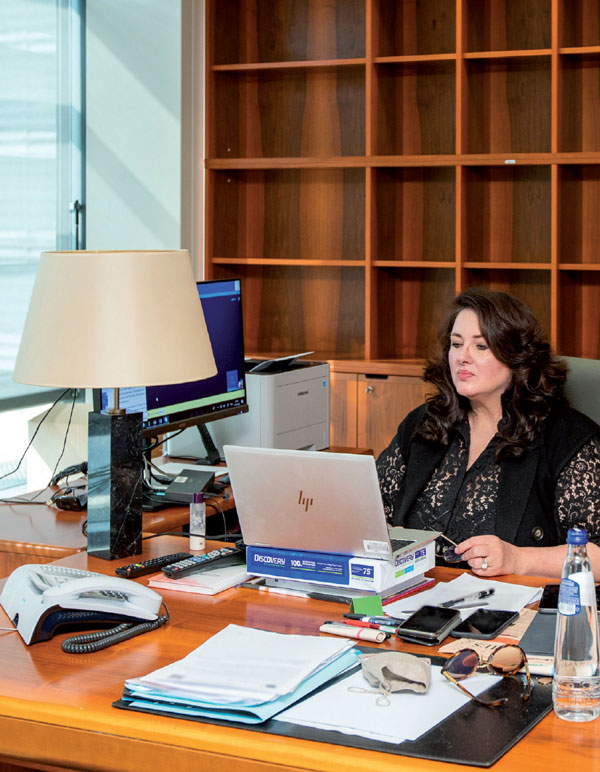
«Es irónico que celebremos los 20 años de la Directiva sobre igualdad racial, y todavía tengamos problemas estructurales»
–Mencionaba que existe una brecha entre la legislación y el impacto en las personas ¿Cómo se podría fortalecer el papel de las autoridades al aplicar la legislación?
–Lo trataremos en el plan de acción. Abriremos un proceso de consulta previo. Ya mantuvimos una muy buena discusión en el colegio de comisarios a finales de junio. Mi equipo es el responsable de liderar y coordinar el trabajo sobre este plan de acción. Pero para mí, lo esencial es cambiar las actitudes y la cultura. Y tenemos que ser todos quienes tengamos esta perspectiva de igualdad. Si se tratara solo de mi cartera de Igualdad la que hiciera el trabajo, sería un esfuerzo superficial. Tenemos que abordarlo desde todas las facetas de la política, para que lo que hagamos se vuelva sustancial y realmente afecte la vida de las personas.
–Ya que menciona el papel de sus colegas, el comisario de Justicia, Didier Reynders se disculpó de manera poco convincente por su aparición con la cara pintada de negro durante un desfile tradicional en Bélgica. ¿Cree que debería haber sido más contundente al pedir perdón y arrepentirse?
–Reynders fue uno de los que realmente contribuyeron al debate en el colegio de comisarios sobre el racismo. Además, presentó la estrategia de derechos de las víctimas, una aportación muy buena que afecta a las personas que sufren discriminación racial. Me gusta juzgar a las personas según su trabajo. Creo que Reynders ha hecho un trabajo muy bueno con los derechos de las víctimas.
–Entonces, ¿está satisfecha con su disculpa?
–No he dicho que lo esté. Solo digo que estoy satisfecha con el trabajo que está haciendo en este área. Está trabajando muy duro. Y obviamente cooperamos muy de cerca debido a nuestras competencias.
«Estoy realmente impresionada sobre cómo se abordó el problema de la desigualdad en España»
–¿Qué opina sobre el debate de retirar algunas estatuas de personajes históricos polémicos o esclavistas?
–Conocer nuestra historia nos ayudará a no repetir ciertos errores cometidos en el pasado. No soy muy fan de las estatuas como regla general. Las aprecio cuando son buenas obras de arte. Pero siempre he sostenido que los monumentos que dejamos atrás, nuestro legado, es nuestro trabajo.

–¿Se siente cómoda cuando ve la estatua del rey Leopoldo II de Bélgica en la entrada del barrio europeo en Bruselas, sabiendo que su dominio en el Congo provocó hasta 10 millones de muertes?
–Cuando lo veo, recuerdo todas estas cosas, y no es algo bueno para recordar. Por eso es importante conocer nuestra historia. Y aprendemos de ello. Por eso es bueno que exista una discusión sobre este tema, porque significa que, con razón, somos críticos. Es saludable tener ese debate.
–¿Le preocupa que las desigualdades hayan aumentado tras el impacto del Covid-19, y que las minorías hayan sufrido más la pandemia?
–Estoy muy preocupada. Durante las pasadas semanas he estado en contacto con algunos de estos grupos, como las personas con discapacidad, el colectivo LGTBI, mujeres y minorías étnicas. Estamos reuniendo lo que hemos aprendido y lo utilizaremos para nuestra estrategia LGTBI plus, que será la primera de la UE sobre esta materia, y que llegará a finales de este año. También tenemos una estrategia sobre discapacidad que se lanzará a principios de 2021. Y presentaremos otra de inclusión para la población gitana, en la que nos nutriremos de la experiencia de la pandemia.
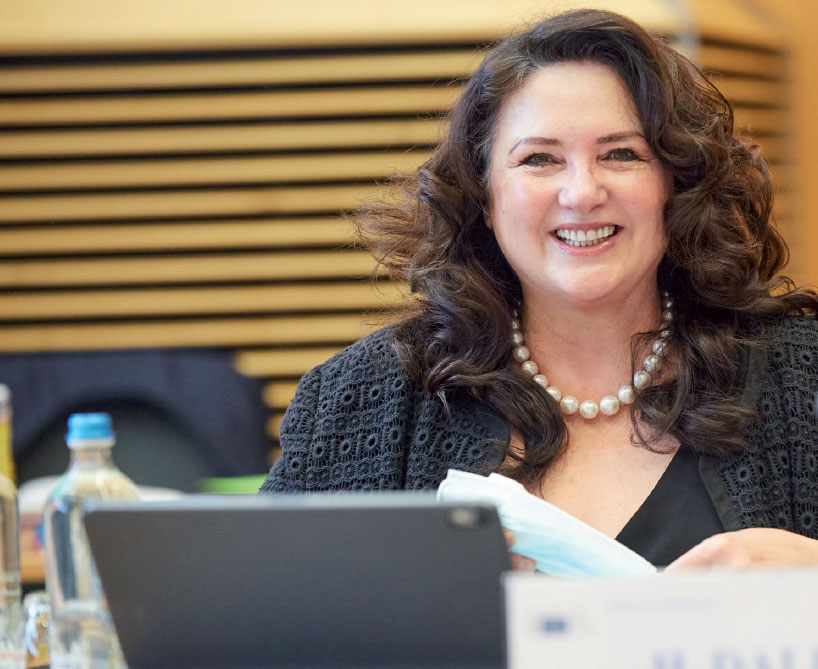
–¿Cuál ha sido el impacto del confinamiento en la vida de las mujeres que sufren violencia de género?
–Como dice, hubo mujeres víctimas de violencia doméstica que tuvieron que ser confinadas en un pequeño apartamento con su abusador. Escribí a los Estados miembros, junto con el comisario Schmit (Empleo) y la comisaria Kyriakides (Salud) para decirles que estén atentos a estas cosas. España presentó muy buenas ideas para que las mujeres pudieran denunciar la violencia doméstica sin ser rastreadas por su pareja que está abusando de ella. Pueden ir a la farmacia y usar un código que muestre que está en peligro, por lo que la farmacia tomará medidas y enviará a la policía. Me animó mucho ver que la mayoría de los Estados miembros observan constantemente lo que está sucediendo y buscan soluciones para que estas personas no se sientan aún más sola. También escuchamos sobre abusos en el hogar de personas mayores, o entre personas LGTBI, por ejemplo, personas transgénero a las que se les negó el tratamiento, y en algunas situaciones era una emergencia.
«Existe un problema cuando observamos el desempleo, discriminaciones en las contrataciones, también con la vivienda o en materia de salud»
–¿Cuál es, en su opinión, el progreso realizado por España en todos estos frentes?
–El Gobierno está trabajando muy duro en estas áreas. Estoy realmente impresionada sobre cómo se abordó el problema de la desigualdad en España. Ya mencioné muchas acciones tomadas en el contexto de la violencia contra las mujeres. También abordaron el asunto de las mujeres en empleos precarios, o aquellas que pierden sus empleos. Veo un buen progreso en España. También apoya lo que queremos conseguir respecto a la transparencia salarial, aunque creo que en España está ligeramente por debajo de la media de la UE en lo que respecta a la brecha salarial de género; creo que está en torno al 15%, ligeramente por debajo de la media europea. Y el Gobierno español respalda mucho todo lo que hacemos con el colectivo LGTBI.
–Se organizó una manifestación a favor de los derechos de la mujer el 8 de marzo. ¿Cree que fue una buena idea mantener esta marcha, cuando había señales muy claras de la propagación del virus?
–No puedo comentar sobre eso. No conozco los detalles. Diría que es bueno obedecer a las autoridades sanitarias. Sin instituciones sanitarias sólidas, estaríamos en una situación mucho peor.

Huella digital
HELENA Dalli nació en Valeta (Malta) en 1962. Algunos datos sobre su vida y su carrera política pueden encontrarse principalmente en su página en inglés en Wikipedia.
Su completa página en la Comisión Europea incluye su currículo, sus principales tareas, su equipo, su agenda o sus audiencias de confirmación en el Parlamento Europeo.
La comisaria también tiene una cuenta de Twitter, en la que informa sobre sus actividades.
Digital fingerprint
HELENA Dalli was born in Valletta, Malta in 1962. Some facts about her life and political career can be found on her Wikipedia page.
Her European Commission page includes her CV, her main tasks and her team, her agenda and the confirmation hearings in the European Parliament.
The commissioner also has a Twitter account, where she reports on her activities Wikipedia page.
In English
Helena Dalli, european commissioner
“Racism is alive in Europe”
Helena Dalli became last December the first EU commissioner for Equality, an issue very close to her heart and her political career. She is now working on numerous strategies to fight for gender equality and support minorities and vulnerable groups in Europe, including LGTBI and Roma, especially in the aftermath of the covid-19 pandemic.
Following the protests against racism across the world, Dalli will also take care of the European Commission’s new action plan to address the structural racism existing across the board in Europe. As she told Escritura Pública in an interview, “racism is alive in Europe”
–The European Commission will put forward an action plan against racism later this year. What initiatives are you considering as part of the strategy?
–We have been discussing even prior to what is happening right now, because racism is alive in Europe, not just in the US. It’s ironic that we’re celebrating the 20 years of the racial equality directive, and we still have structural problems. Racism has not been eradicated. There is a wide gap between legislation and how effective that legislation is on people’s lives. We will focus on what is underneath the tip of the iceberg, the structural racism, which is more difficult to address.
–What do you mean?
–This is an issue when you look at unemployment, for instance at recruitments, or housing and health access. There’s also an unconscious bias. Sometimes, without knowing, people can be racist, especially white people in the sense that we identify with people who are “like us”, so we might be discriminating.
–And what about inside the Commission?
–We shall be looking also internally. We have been working already with Commissioner Hahn (Human Eesources). We are exploring how we can address this reality. This cannot change overnight. But it’s not enough to say that black people don’t apply for jobs. We have to see what kind of education or training they are getting, so that they will be able to have good qualifications and compete. Our intention is to leave no stone unturned. The fact that, for the first time, the EU has a portfolio dedicated entirely to equality sends a message that Europe needs to address these realities in a strong way. There’s a lot to do.
–Do you think that, perhaps, there was structural racism also inside the Commission given the lack of diversity among its staff?
–There is an unconscious bias. And yes, structural racism. But I think it’s everywhere. And that is why we have to address the roots of the problem, not just the symptoms, not just the results. We have to think ‘out of the box’ and find ways to see how we can bring more diversity into the whole process. For example, looking at universities and sponsorships for instance for students, so we recruit trainees and we make sure that we are more diverse in our in our choices.
–Since you spoke about the distance between the actual legislation and the reality, how could you strengthen the role of the national authorities to implement the rules?
–There will be a consultation process to discuss the action plan. We had a very good discussion in the college of commissioners. My team has the job to lead and coordinate the effort. But for me, what is essential is to change attitudes and culture. We have to remember we are all together with this equality perspective, in all the portfolios. If it was just the equality portfolio doing the work, it will be superficial. We have to address all policy areas, so that what we do becomes substantial and really affects people’s lives.
“Racism is alive in Europe, not just in the US. It’s ironic that we’re celebrating the 20 years of the racial equality directive, and we still have structural problems”
–Since you mentioned the role your colleagues should play, commissioner Didier Reynders gave a half-hearted apology for his appearance with his face painted in black during a traditional parade in Brussels. Do you think he should have been more convincing?
–Commissioner Reynders was one who really contributed to the debate in the college on Wednesday. He also presented the victims rights strategy, a very good plan that affects people being racially discriminated. I like to judge people according to their work. I think commissioner Reynders has done a very good job on this victims rights strategy.
–Are you satisfied with his apology then?
–I didn’t say I am satisfied. I am just saying I am satisfied with the work he is doing in this area. He’s working very hard. And obviously we work very closely because our portfolios.
–What do you think about the debate on withdrawing some statues of controversial historical figures?
–Knowing our history will help us not to repeat certain mistakes committed in the past. I am not very fond of statues as a rule. I appreciate them when they are good pieces of art. But I have always held that the monuments that we leave behind us, the legacy, is our work.
–For example, do you feel comfortable with having the statue of King Leopold II at the entrance of the European neighbourhood in Brussels, knowing that up to 10 million people died in Congo while he was its ruler?
–When I see it, I remember all these things, and it’s not a good thing to remember. That’s why it’s important to know our history. And we learn from it. And we can be critical of how it is represented today. But it’s good that there’s discussion about this, because it means that we are, rightfully so, being critical and being vocal also about our criticism. It is healthy to have such a debate.
–Are you concerned about the fact that inequalities increased during the pandemic, and minorities were more affected by the virus?
–I’m very concerned. Over the past weeks, I’ve been in contact with some of these groups, such as people with disability, LGTBI people, women, and ethnic minorities. We are gathering what we have learned and will feed into our LGTBI plus strategy, which will be the first EU strategy on this issue coming by the end of this year. We will also publish a disability strategy in the beginning of 2021. We will also release a Roma inclusion framework, where we shall be also feeding the experience gathered during the pandemic.
–What was the impact of confinement on women suffering of gender violence?
–Indeed, there were women victims of domestic violence that had to be confined in a small apartment with their abuser. I wrote to member states, together with commissioner Schmit (Employment) and commissioner Kyriakides (Health) to tell them to look out for these things. Spain came out with very good ideas for people or women reporting for domestic violence, without being traced by her partner who is abusing her. They could go to the pharmacy and use a code that will show that she is in distress, so the pharmacy will take action and send the police. I was very encouraged to see that most member states are really
“It’s good that there’s discussion about the statues, because it means that we are, rightfully so, being critical and being vocal also about our criticism. It is healthy to have such a debate”
watching what is happening and coming out with solutions so these people won’t be even more alone. We also heard about abuses in old people’s home, or among LGBTI people, including trans people being denied the treatment, which sometimes is life threatening, but they were told it was not an emergency.
–What do you think of the progress made by Spain on Equality, especially in light of the crisis we are suffering?
–The Spanish Government is working very hard in this policy area. I’m really impressed about how the issue of inequality was addressed in Spain. I mentioned already a lot of actions taken In the context of violence against women. They also worked on women in precarious employment and losing their jobs. I’m seeing good progress in Spain. They also support what we want to do with regards to pay transparency, even though I think that in Spain the gender pay gap is around 15%, slightly below the the European average. In addition, the Spanish government is very supportive of all what we do with LGTBI.
“I’m really impressed about how the issue of inequality was addressed in Spain”
–There was a demonstration in favor of women rights in Spain on 8 March. Do you think it was a good idea to maintain this march, when there were already very clear signals of the virus spreading in Europe?
–I cannot comment on that. I don’t know the details. I would say that it’s good to obey the health authorities. Had we not had strong health institutions, I think we would be in a much worse situation.



